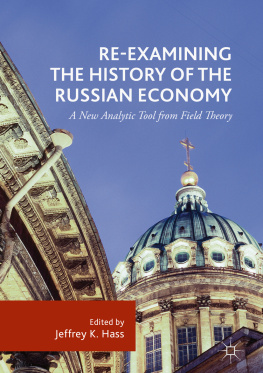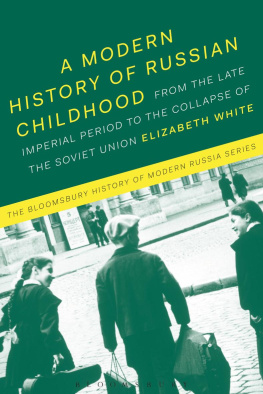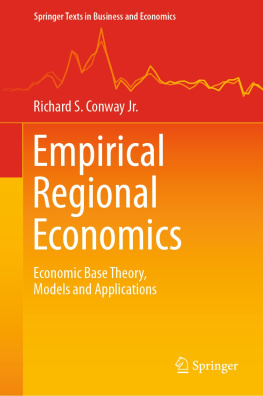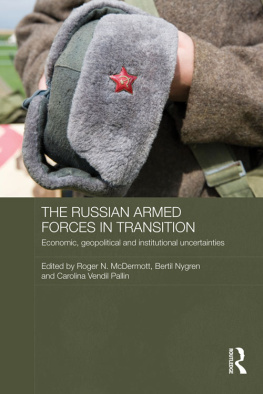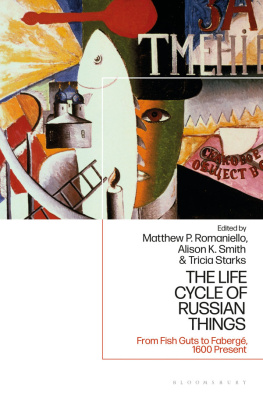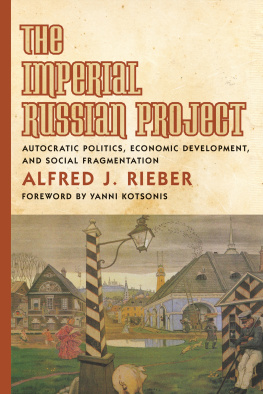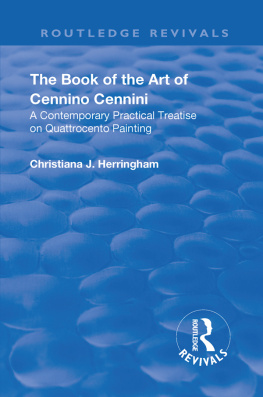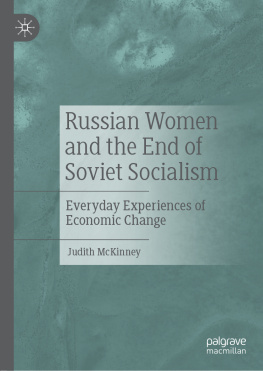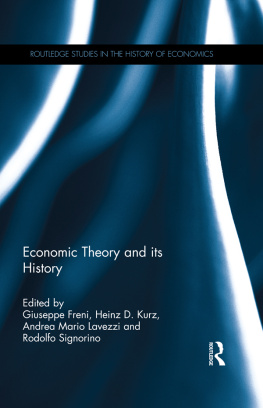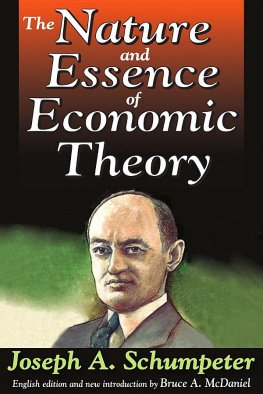1. Fields in Russian Economic History
This volume resulted from the collective endeavor of an American sociologist and Russian economists. Despite being in different disciplines, we all share more than one might expect. In a departure from all-too-often interdisciplinary struggles and sniping, we all know the same literature from both disciplines and share a healthy appreciation, and skepticism, for the social sciences. In particular, two shared interests made this volume possible. The first is Russias economypast, present, and futurewhich drives our research and teaching. Each chapter reflects one facet of our myriad interests in how Russias economy has operated, changed, evolved, or broken down. The general, abstract theory of economics and sociology comes alive, warts and all, when we engage that theory with Russias reality across the centuries. And we all share the conviction that Russias stories have something important to add to human knowledge about economics, just as economics and sociology have something to say about Russias experiences.
This brings us to a second shared interest: possible insights and potential of field theory. Hass had been working with variations of field theory since his days in Princetons graduate program in sociology in the 1990s, where he learned from one of field theorys founders, Paul DiMaggio. His dissertation and first project involved fields, habitus , and economic practices in Russias post-socialist experience. Members of the Department of Economic Theory of the Faculty of Economics at St. Petersburg State University also knew the work of Pierre Bourdieu, and they had been applying various facets of that framework in their work on religion and economy, Old Believers, the historical roots of Russian economic theory, inflation, and so on. We all found it odd that Russia was absent from the general corpus of field scholarship (but we mention a few exceptions later). In discussions over a few years, we concluded that it was natural to combine our interests, knowledge, and efforts to address this oversight, both to expand the horizons of field theory and to open up Russias rich economic history to a new analytic approachone that retained insights of political economy and appreciated of culture in a non-ad hoc manner. This serendipitous congruence of interests and cross-disciplinary knowledge bred this project.
One of our goals is to bring Russia and fields into closer proximity to see how theory and reality can inform each other. Some of us have written explicitly on fields and Russia, and others scholarship has come close enough to these two topics that it was natural for them to take the next step of engaging Russia and fields. We have also not been content with the existing state of affairs in much field theory. Neoinstitutionalist field theory, usually employed to organizational analyses, has worked well for cases of stable capitalist economies (especially the United States), but we suspect that this has also needlessly narrowed the possible territory a field framework could cover. For example, the usual field theory tends to focus on organizational and institutional fields, privileging one particular level of analysis (the meso). While we will also engage the meso level here, some authors also point to multiple levels of fields intersecting: for example, fields of interpersonal networks nested inside organizations and institutions still might have their own dynamics as a community of actors oriented to particular rules of engagement and goals of strategies and practices. And inasmuch as institutions can create or shape networks by bringing actors into proximity, network-based fields can in turn affect higher-level institutional fields if those actors have positions or luck to propagate particular rules or ideologies.
Expanding Field Theory, with Help from Russias Economic Reality
Field frameworks were embraced in the natural sciences, but in the social sciences and humanities, the pace of development has been slower. Psychologists in the Gestalt tradition grounded their theory in fields of perception, and Max Webers sociology has a field logic running through it (Martin ). Much social science continues to focus on correlations between actors as bundles of traits essential to that actor (years of education, gender, employment) when trying to explain tastes or consumption, careers, wages, and so forth. Studies of policies and development are little different, except actors are not individuals but institutions and the explicandum is economic structure, productivity, or growth. Much scholarly progress was made in this logic of analysis, yet there were limits, such as the persistence of seemingly irrational behavior or the failure of regression to norms (whether economic policies and structures, or everyday practices).
Enter field theory, which made strides after the appearance primarily of Paul DiMaggio and Walter Powells (): mimetic, normative, and coercive.
Neoinstitutionalist field theory is primarily structural and meso-level: actors themselves are buffeted by isomorphic forces within fields. Bourdieu, however, adds actors to his framework to make sense of how collective practices and structures are continuously reproduced in the first place, especially when not everyone in a field is a winner. An important facet of a field framework is how actors are conceptualized. Rather than being a bundle of preferences for consumption or gain that a rational agent seeks to maximize, we have actors that are intersections of various relations, which in turn shape that actors broader dispositions and knowledge. The usual instrumental approach of microeconomics and much political science, unfortunately, misses two important facets of economic practice: the source of actors own preferences and tool kits of perceptions and strategic responses, and emergent properties of institutional systems and actors. So, Bourdieus schema begins with habitus : crudely put, an individuals structured knowledge and how to use that knowledge. This constrains and enables how one interprets and responds to the world. A second leg of Bourdieus framework is capital , existing resources actors deploy: social (e.g. networks and reputation), economic (money or shares), cultural (tastes and behavioral skills), and symbolic (status symbols, such as credentials). (One could add institutional capital, i.e. formal access to formal rules and organizations.) Bourdieu suggests that how actors use capital depends, first, on habitus do they know how to gain and use capitaland on the rules of the concrete institutional context that govern the status and use of said capital. This brings in the third leg of Bourdieus framework, fields , which are arrangements of actors and rules. (Bourdieu uses two metaphors to illustrate what he means: a magnetic field orienting actors in a particular way, e.g. categories and strategies of action, and a field of battle with actors arrayed in alliances and confrontations.) Behavior in the field is governed by doxa , taken-for-granted rules of entry into and engagement within the field.
These three entities interact in Bourdieus framework. Field location shapes an actors habitus and capital, the first from experience and the second from rules of resource access. Actors internalize field rules, and resulting habitus influences how they judge and respond to contexts (opportunities, threats, etc.), although habitus does not overwhelm individual agency. This suggests that post-socialist economic change has not been only competing elites and interests. Rather, it has been competing assumptions and knowledge of how a normal economy operates, and conflict over ritualizing and normalizing these assumptionsand primacy of particular knowledge, habitus , and capitalin organized fields of property and governance. This suggests that economic organization is not merely the evolutionary emergence of efficient means for producing, trading, and making profit. Rather, economic organization is the institutionalization of norms and logics of what constitutes a normal economy. Actors compete and struggle to defend and enforce what they consider to be the ultimate meaning of economic action, which acts as a measuring rod for the status and legitimacy of economic tactics and relations. Victors in such struggles impose their versions of normality via laws, organizational structures and procedures, and arrangements of property ownership. In this regard, post-socialist economic change has been no different than the emergence of capitalism or state socialism. To better understand the post-socialist process, we must broaden our vision, beyond usual political economy of immediate interests of state and business elites, to logics of economic actionlogics inculcated in their biographies and manifest in habitus of knowledge, strategies, and practices.

